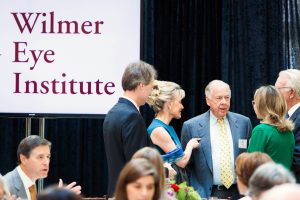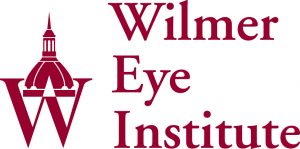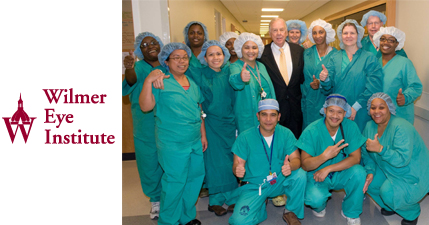 The Wilmer Eye Institute of Johns Hopkins University School of Medicine has been long recognized for its flexible approach for delivering state-of-the-art ophthalmic care.
The Wilmer Eye Institute of Johns Hopkins University School of Medicine has been long recognized for its flexible approach for delivering state-of-the-art ophthalmic care.
The Pickens Foundation in October announced plans to give $20 million to The Johns Hopkins University to support daring but potentially vision-saving research at the university’s Wilmer Eye Institute. Pickens has been treated at Wilmer for cataracts and for macular degeneration.
 The gift, included in Pickens’ estate, will create an endowment to fund a T. Boone Pickens Scholars program, supporting clinician-scientists with promising and innovative ideas for new research avenues. When complete, the Pickens bequest will bring his support of Wilmer to more than $28 million. He established the Boone Pickens Professorship in Ophthalmology in 2005, and later contributed $6 million to construction of the institute’s Robert H. and Clarice Smith Building, which opened in 2009.
The gift, included in Pickens’ estate, will create an endowment to fund a T. Boone Pickens Scholars program, supporting clinician-scientists with promising and innovative ideas for new research avenues. When complete, the Pickens bequest will bring his support of Wilmer to more than $28 million. He established the Boone Pickens Professorship in Ophthalmology in 2005, and later contributed $6 million to construction of the institute’s Robert H. and Clarice Smith Building, which opened in 2009.
 During the past five years, new injection treatments have enabled Wilmer doctors to prevent blindness in about 90 percent of macular degeneration cases, says Neil M. Bressler, the James P. Gills Professor of Ophthalmology and director of Wilmer’s Retina Division. The Wilmer Eye Institute brings together ophthalmologists consistently ranked by their peers as among the finest internationally, with a specially trained and highly experienced team of nurses, technicians and staff cited by patients for their knowledge, responsiveness, and sensitivity. They treat ophthalmic disease at Baltimore’s Johns Hopkins Hospital and at seven other locations in Maryland.
During the past five years, new injection treatments have enabled Wilmer doctors to prevent blindness in about 90 percent of macular degeneration cases, says Neil M. Bressler, the James P. Gills Professor of Ophthalmology and director of Wilmer’s Retina Division. The Wilmer Eye Institute brings together ophthalmologists consistently ranked by their peers as among the finest internationally, with a specially trained and highly experienced team of nurses, technicians and staff cited by patients for their knowledge, responsiveness, and sensitivity. They treat ophthalmic disease at Baltimore’s Johns Hopkins Hospital and at seven other locations in Maryland.
Macular degeneration also afflicted Pickens’ father, who was legally blind by the time he reached Pickens’ age. Pickens has received new macular degeneration treatments developed in just the past decade that preserved his vision, which his treatment team says is 20/40.
“I’m doing pretty good,” Pickens says. “When I have a problem — and I do have an eye problem and all — I find the best, and that was Wilmer. It’s great to know you are able to make such a positive contribution to medical research for generations to come.”
The Wilmer Eye Institute has long been recognized for bringing together ophthalmologists consistently ranked by their peers as among the finest internationally, with a specially trained and highly experienced team of nurses, technicians and staff cited by patients for their knowledge, responsiveness, and sensitivity.
“What this gift will do is allow us to scour the globe, not just the United States, to find the best and brightest young minds, bring them here as Boone Pickens Scholars, [and] invest in them the resources that will allow them to explore that brilliant idea that, if it pans out, is going to be a game changer,” says Peter McDonnell, the William Holland Wilmer Professor of Ophthalmology and director of the institute.
“Funding for very, very novel and innovative research has always been very difficult,” says Paul Rothman, dean of the Johns Hopkins School of Medicine and CEO of Johns Hopkins Medicine. “Now, with cutbacks in federal funding, gifts like that of Boone Pickens are really essential for us to move forward impactful research that otherwise is not going to get funded.”
Wilmer’s clinical eye services are comprehensive, and include medical and surgical evaluation and management of ophthalmic conditions and diseases, including but not limited to the following areas of focus: cornea and cataract, strabismus, glaucoma, cosmetic and medical oculoplastics, retina, and neuro-ophthalmology. Wilmer’s surgeons also offer the latest refractive procedure technology both with Lasik surgery, as well as with the surgical use of deluxe intra-ocular lenses in cataract surgery, designed to reduce dependence on eyeglasses after surgery.
For more information about the Wilmer Eye Institute, visit www.hopkinsmedicine.org/wilmer/

Published by